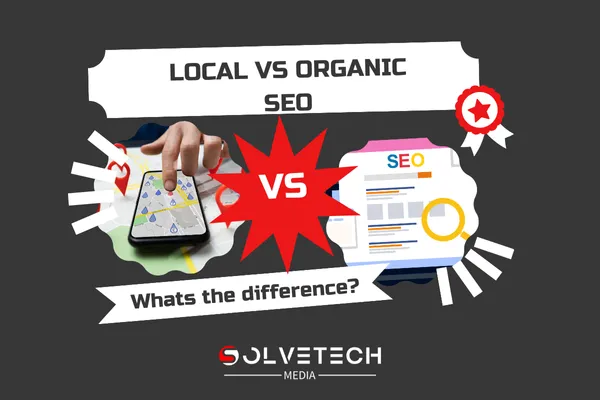BLOGS

Local vs. Organic SEO: Understanding the Differences and Benefits
Local vs. Organic SEO: Understanding the Differences and Benefits
In the ever-evolving world of digital marketing, search engine optimization (SEO) plays a critical role in driving traffic and visibility for businesses. Two main types of SEO strategies are often discussed: Local SEO and Organic SEO. Each serves a unique purpose and can be leveraged to meet different business goals. This blog post explores the distinctions between Local and Organic SEO and how businesses can use them effectively.
What is Local SEO?
Local SEO focuses on optimizing a business's online presence to attract more customers from relevant local searches. These searches occur on Google and other search engines. Local SEO is crucial for businesses that operate on a regional level, as opposed to national or international.
For instance, queries like "seo tupelo ms," "tupelo seo," and "local advertising in tupelo" indicate a strong local intent. Here’s how Local SEO can benefit businesses targeting local customers:
Google My Business Optimization: Creating and optimizing a Google My Business (GMB) profile is a foundational aspect of Local SEO. Ensure your business name, address, phone number (NAP), and other details are accurate. Regular updates, customer reviews, and engaging posts can significantly enhance your local visibility.
Local Citations: Being listed in local directories like Yelp, Yellow Pages, and local chambers of commerce websites helps improve local search rankings. Consistency in NAP across all listings is crucial.
Localized Content: Creating content that resonates with local audiences, such as blog posts about local events or news, can boost your local SEO efforts. Using keywords like "digital marketing company mississippi" or "tupelo digital marketing" can help attract local traffic.
What is Organic SEO?
Organic SEO, on the other hand, focuses on improving the visibility of a website on a national or global scale. It involves a wide range of on-page and off-page strategies aimed at improving the site's ranking in search engine results pages (SERPs).
Organic SEO strategies include:
Keyword Optimization: Identifying and using high-volume, relevant keywords within your website’s content, meta descriptions, and headers. Keywords such as "video marketing," "creative agency," and "marketing agency" are essential for attracting broader audiences.
Content Creation: Producing high-quality, engaging content that meets the needs of your target audience. Blog posts, articles, videos, and infographics can drive organic traffic and improve rankings.
Link Building: Acquiring backlinks from authoritative websites signals to search engines that your site is a trusted source of information. This can significantly boost your organic search rankings.
Technical SEO: Ensuring your website is fast, mobile-friendly, and free of technical issues that could hinder search engine crawlers from indexing your site properly.
Key Differences Between Local and Organic SEO
Target Audience:
Local SEO targets users searching for businesses within a specific geographical area.
Organic SEO targets a broader audience without geographical limitations.
Strategies:
Local SEO relies heavily on GMB optimization, local citations, and localized content.
Organic SEO focuses on keyword optimization, content creation, link building, and technical SEO.
Search Intent:
Local SEO addresses search intents like “near me” queries or specific location-based searches.
Organic SEO addresses informational, navigational, and transactional search intents.
Combining Local and Organic SEO for Maximum Impact
While Local and Organic SEO serve different purposes, combining both strategies can provide comprehensive benefits. For businesses operating both online and in physical locations, integrating these approaches can maximize visibility and traffic.
Local Keywords in Content: Use local keywords within your broader content strategy. For example, blog posts on topics like “The Benefits of Local Advertising in Tupelo” can attract both local and wider audiences.
Localized Landing Pages: Create landing pages optimized for local search queries. This helps capture local traffic while supporting overall SEO efforts.
Cross-Platform Strategies: Engage in social media marketing, email campaigns, and other digital marketing strategies to complement your SEO efforts.
Conclusion
Understanding the differences between Local and Organic SEO is crucial for businesses looking to optimize their online presence. By leveraging both strategies, you can attract a diverse audience, enhance your visibility, and drive more traffic to your site. Whether you’re targeting local customers in Tupelo, MS, or aiming for a broader market, integrating Local and Organic SEO will position your business for success.
SolveTech Media empowers small businesses with innovative digital marketing solutions, igniting growth, amplifying online presence, and creating lasting connections. We lead with passion for storytelling and data-driven strategies, driving our clients to success in the dynamic digital landscape. With unwavering dedication and expertise, we transform brands, empowering small businesses to thrive.
© Copyright . SolveTech Media. All rights reserved.





